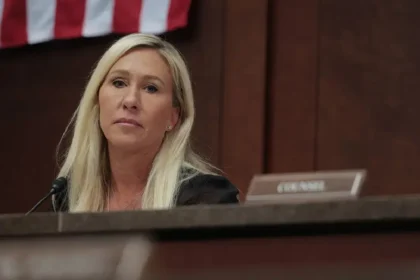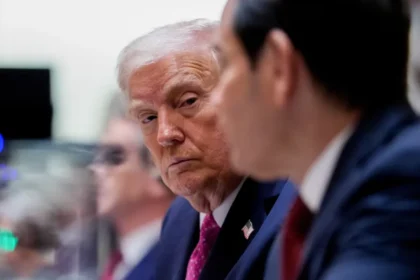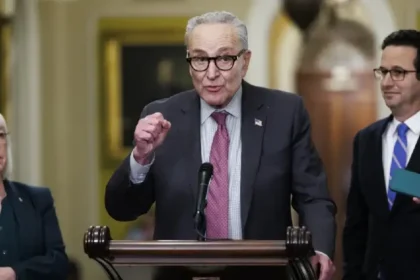Newly-released Epstein messages tie congressional hearing to Trump era scrutiny
Documents from Epstein’s estate reveal text-exchanges with a member of Congress during a 2019 hearing on his former lawyer, raising fresh questions about the scope of Epstein’s influence and the lasting reputational risk for Donald Trump.
In February 2019, during the stirring congressional testimony of Michael Cohen — then lawyer for Donald Trump — a trove of documents now shows Epstein exchanging text messages with a House lawmaker during the very hearing. The lawmaker is widely identified as Stacey Plaskett, the non-voting delegate from the U.S. Virgin Islands. The timing and content of the messages which appear to coincide with Plaskett’s turn to question Cohen suggest a possible coordination or influence at a moment when Trump’s past and his organization were under scrutiny.
While Plaskett has not confirmed the texts, the correspondence is marked by Epstein referring to “RONA-keeper of the secrets,” a misspelling of Rhona Graff a former executive assistant to Trump. Minutes later, Plaskett asked Cohen about Graff’s role in the Trump Organization. Investigators say the alignment between Epstein’s messages and Plaskett’s questioning is striking.
Why It Matters for Trump
Donald Trump has long sought to distance himself from Epstein, who pleaded guilty in 2008 to soliciting prostitution from a minor and was later arrested in 2019 on federal sex-trafficking charges. Trump has publicly stated he “had no idea” about Epstein’s abuses, yet the new documents cast renewed light on the scope of Epstein’s connections not only to Trump’s circle, but to members of Congress engaged in litigation and investigation related to the Trump Organization.
Even if there is no direct evidence of Trump interacting with Epstein in these particular messages, the revelation deepens the optics of a network that orbited both Trump-adjacent business interests and political settings. At a minimum, the resurfaced texts underscore how Epstein maintained political access and influence a fact that may reflect on the broader ecosystem around Trump during his era.
The Texts and Their Implications
The released messages show Epstein texting at 7:55 a.m., ahead of the hearing, asking: “what privilege stands behind the none release of college transcripts?” Plaskett responded: “He’ll talk about his grades.” Later, as Epstein watched the hearing live, he referenced Graff and the Trump Organization CFO, Allen Weisselberg, then messaged: “Hes opened the door to questions re who are the other henchmen at trump org.” Minutes later Plaskett went on to ask Cohen to identify Graff’s role.
Epstein also sent a message saying: “Are you chewing” shortly after a camera feed captured Plaskett apparently chewing. His message: “Great outfit … You look great.”
While the messages do not show a direct instruction, the timing and content suggest Epstein had real-time awareness of the hearing’s proceedings and may have guided the lawmaker’s line of inquiry.
Government Response and Legal Fallout
Plaskett’s office confirmed that she received texts during the hearing from staff, constituents and the public, acknowledging Epstein among them, but stated she is “not in a position to confirm or not” that the texts were from Epstein himself. She emphasised her long record of combating sexual abuse and trafficking in the U.S. Virgin Islands.
The release of the documents comes amid broader reviews of Epstein’s network, which includes business, political and philanthropic ties. For Trump and his circle particularly in view of Cohen’s allegations of financial wrongdoing inside the Trump Organization the texts raise renewed questions about what Epstein may have known, and when issues that have long swirled around Trump’s past relationship with Epstein, including trips, parties and ideas of leverage.
What Comes Next
Legal scrutiny is unlikely to centre on Plaskett now, but the messaging adds fuel to investigations and public discussion about transparency and influence. For Trump, while he is not implicated directly in the newly-released messages, the developments renew attention to the overlapping spheres of his business empire, political influence and the Epstein‐Web.
Media and political analysts suggest the revelations may:
-
Prompt additional demands for full disclosure of Epstein estate documents and donor records.
-
Add political vulnerability for Trump and his allies as the public assesses the breadth of Epstein’s access.
-
Raise questions about lobbying, influence and the evolution of Trump’s network before and after his presidency.
At the heart of it: the question lingers was Epstein influencing government oversight in real time, and what does that say about the boundaries of power during Trump’s era?
Final Thoughts
Donald Trump’s association with Epstein has long been a reputational flashpoint. The newly-disclosed texts connecting Epstein to a member of Congress during a high-profile hearing involving Trump’s former lawyer may not prove legal wrongdoing by Trump, but they deepen the web of concern. While many details remain opaque, the incident underscores how Epstein’s reach extended into the halls of power.
As the documents continue to be digested and examined, Trump’s legacy around Epstein may face renewed scrutiny. For now, the story offers a reminder: even absent direct legal consequence, influence and access can leave traces and in the age of uploaded document dumps and viral media, those traces may prove enduring.











